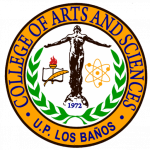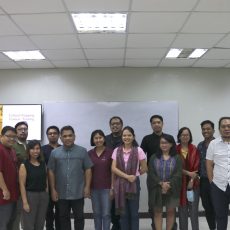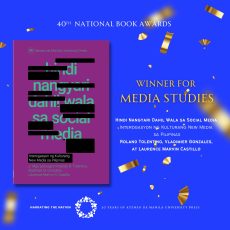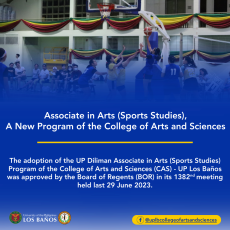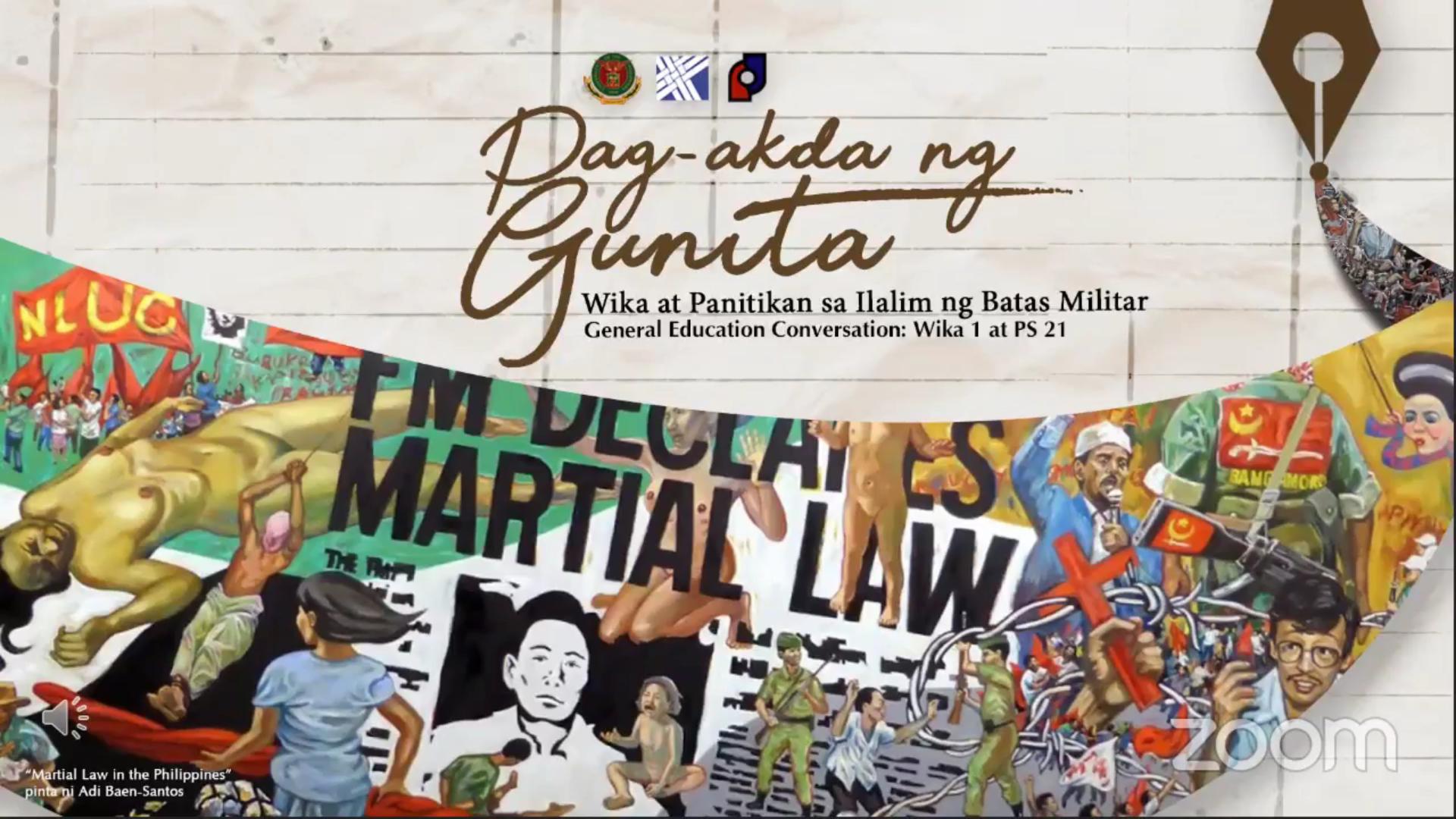
The Wika 1 and PS 21 courses from the Department of Humanities (DHum) and the Department of Social Sciences (DSS) held a GE Conversation webinar last September 27 about the significance of language, literature, and the arts in the time of Martial Law. The webinar, entitled “Pag-akda ng Gunita: Wika at Panitikan sa Ilalim ng Batas Militar,” featured four resource speakers who provided their insights on the different aspects of Martial Law, from its history to the roles of literature and art, language, and education in the struggle against the Marcos dictatorship.
DHum Chairperson Dr. Leonora Fajutagana delivered the opening remarks and emphasized the importance of deep, critical, and substantial discourse in place of shallow and vulgar conversations which may also seek to distort the truth, a reality that continues to this day. She also explained that each GE Conversation seeks to raise awareness and foster critical thinking especially in the age of (dis)information with rampant acts of revisionism and erasure.
Umalohokan, Inc. followed with a cultural presentation depicting the atrocities of Martial Law, remembering its victims, and the struggle of the people.
Dr. Roderick Javar, of the DSS History Division, began the formal discussion by providing a historical context to Martial Law with his presentation entitled “Ang Batas Militar ni Marcos: Panimula at Pagpopook”. His four-part talk tackled the definition of Martial Law, the path Marcos took to power in Malacañang until he placed the Philippines under military rule, the reasons and bases used by Marcos to issue Proclamation No. 1081, and the Philippine social conditions under Martial Law.
Multi-awarded Filipino writer and activist Mr. Bonifacio Ilagan, in his discussion entitled “Panitikang hindi Pagagapi”, traced the roots of ‘committed art’ and the ‘literature of resistance’ back to the First Quarter Storm (FQS) of the 1970s. He briefly discussed the effects of Martial Law and the people’s struggle from the viewpoint of writers and artists. He finally explained that the commitment of artists is to study society and history, examine the root causes of poverty, and effect social change to afford people opportunities for self-development to their fullest potential.
Prof. Michael Andrada, director of UP Sentro ng Wikang Filipino – Diliman, talked about language as ‘practical consciousness’ in his presentation entitled “21 Salita: Wika at Batas Militar”. He discussed that several words and terms emerged during Martial Law, forming a vocabulary reflective of social practice and the people’s struggle. Among them are the following: Marcos, Imelda, Hitler, diktador, pasista, tuta, bagong lipunan, KY, IBP, MKMP, tigreng papel, kadre, hukbo, AOM, KPKK, cultural revolution, pasabilis, LRP, PPS/CSC, hanay, and STR/STP.
Mr. Karlo Mongaya, from the UP Departamento ng Filipino at Panitikan ng Pilipinas, discussed the implications of the political and economic policies of Martial Law on the education sector in his talk entitled “Pasista at Neoliberal na atake sa Edukasyon sa ilalim ng Diktadurang Marcos”. He explained that the economic measures maintaining the dominance of the United States, such as trade liberalization, deregulation, and privatization, were implemented in the Philippines and even spilled over in the education sector through the shift towards technical-vocational courses, the use of World Bank-funded textbooks, the deregulation of matriculation, as well as campus militarization. The strength of the student and teacher movements eventually resulted in significant concessions from the Marcos regime. These included the demilitarization of campuses, the reinstatement of student councils, the removal of censorship in campus journalism, and the recognition of the right to organize and join student organizations.
Ms. Marie Jopson Plopinio, a board trustee of the Bantayog ng mga Bayani Foundation, a veteran of the Anti-Dictatorship People’s Movement, and the sister of Martial Law martyr Edgar Jopson, served as the reactor for the program. She introduced the Bantayog as a museum and research center studying the lives of people who struggled against the Marcos dictatorship and shared her thoughts on the open and the underground nature of mass movements. She also reminded the youth to let their love of the Filipino people prevail amidst anger against the spreading of lies and continued human rights violations.
Prof. Jonelle Marin, head of the DHum Dibisyon ng Wika, delivered the closing remarks and synthesized the presentations from the resource speakers. She emphasized the long road ahead in rectifying the systematic distortion of history which entails the need for courage and greater perseverance in facing these challenges.
— LG Reyes
